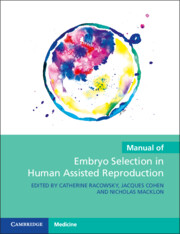Book contents
- Manual of Embryo Selection in Human Assisted Reproduction
- Manual of Embryo Selection in Human Assisted Reproduction
- Copyright page
- Contents
- Contributors
- Preface
- Chapter 1 Introduction
- Chapter 2 Embryo Developmental Programming
- Chapter 3 Embryo–Maternal Interactions
- Chapter 4 The Sperm’s Role in Embryo Development
- Chapter 5 The Oocyte’s Role in Embryo Development
- Chapter 6 The Laboratory’s Role in Embryo Development
- Chapter 7 Handling of Gametes and Embryos
- Chapter 8 Noninvasive Morphological Selection of Oocytes
- Chapter 9 Prospects for Bioenergetics for Embryo Selection
- Chapter 10 Static Morphological Assessment for Embryo Selection
- Chapter 11 Dynamic Morphological Assessment for Embryo Selection
- Chapter 12 Noninvasive Analysis of Embryo Nutrient Utilization for Embryo Selection
- Chapter 13 Genomics for Embryo Selection
- Chapter 14 Biopsy Techniques from Polar Body to Blastocyst
- Chapter 15 Cell-Free DNA Analysis for PGT-A
- Chapter 16 What Science May Come for Embryo Selection?
- Epilogue
- Index
- References
Chapter 4 - The Sperm’s Role in Embryo Development
Published online by Cambridge University Press: 26 April 2023
- Manual of Embryo Selection in Human Assisted Reproduction
- Manual of Embryo Selection in Human Assisted Reproduction
- Copyright page
- Contents
- Contributors
- Preface
- Chapter 1 Introduction
- Chapter 2 Embryo Developmental Programming
- Chapter 3 Embryo–Maternal Interactions
- Chapter 4 The Sperm’s Role in Embryo Development
- Chapter 5 The Oocyte’s Role in Embryo Development
- Chapter 6 The Laboratory’s Role in Embryo Development
- Chapter 7 Handling of Gametes and Embryos
- Chapter 8 Noninvasive Morphological Selection of Oocytes
- Chapter 9 Prospects for Bioenergetics for Embryo Selection
- Chapter 10 Static Morphological Assessment for Embryo Selection
- Chapter 11 Dynamic Morphological Assessment for Embryo Selection
- Chapter 12 Noninvasive Analysis of Embryo Nutrient Utilization for Embryo Selection
- Chapter 13 Genomics for Embryo Selection
- Chapter 14 Biopsy Techniques from Polar Body to Blastocyst
- Chapter 15 Cell-Free DNA Analysis for PGT-A
- Chapter 16 What Science May Come for Embryo Selection?
- Epilogue
- Index
- References
Summary
The male’s contribution to early embryo development remains an underappreciated aspect of reproductive physiology that may become of increasing importance in the application of advanced reproductive technology (ART) in the coming years. Evidence is emerging regarding the importance of sperm chromatin organization, DNA integrity, and sperm-based epigenetic signals that are delivered to the oocyte. In this review we will discuss the current understanding of how the sperm influences early embryogenesis. The existing data connecting sperm factors to poor ART outcomes is critically presented. Finally, practical laboratory methods currently available to the clinical embryologist for sperm optimization will be outlined.
- Type
- Chapter
- Information
- Publisher: Cambridge University PressPrint publication year: 2023

